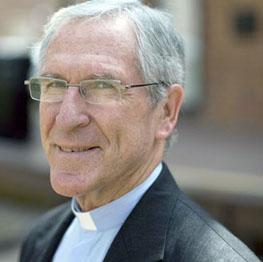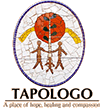
Kevin Dowling was born in Pretoria in 1944 and was ordained a priest for the Congregation of the Most Holy Redeemer on 9th July 1967. He has been Bishop of Rustenberg in North West Province, South Africa since December 1990.
Bishop Dowling has been a powerful advocate for human rights and was prominent in the anti-apartheid movement. Being involved in various community activities in the greater Rustenburg area, he realised that the HIV infection rate and the number of people with AIDS was reaching pandemic proportions in the region, and that resources available to deal with the effects of the disease were limited if not non-existent. Those resources that did exist were not effectively coordinated. Out of this realization was born the Tapologo Programme. “Tapologo”, a Setswana word indicating the theme of “peace and rest” expresses well the Mission of Tapologo which is the guiding response of this faith based community-centred HIV/Aids programme.
The value base of Tapologo stems from a basically Christian perspective but is inclusive of fundamental human and cultural values which are at the heart of life-giving relationships. Its mission will always be inclusive of everyone in the community, but it will especially be concerned for the poorest and most vulnerable members of society.
Among the values at the heart of the Mission of Tapologo are reverence for the individual human person, a deep respect for their journey and story no matter what has happened in their life, and a consequent non-judgemental attitude which is raised to the level of a reverent acceptance of this person’s uniqueness as a human being. This in turn will motivate all the other values of compassion, care, support, solidarity and sharing with people experiencing any form of suffering, marginalisation, alienation and loneliness as a human being, and especially among those who are infected and affected by HIV/Aids.
It takes in all aspects of community relationships and interaction as well, so that people encounter each other as fellow human beings who are sharing the journey towards a deeper quality of life which should reveal the inherent dignity of every person.
But the starting point will always be the great capacity for people to recognise their inner giftedness and resources, their motivations and aspirations to create a better world simply through relationships which breathe the spirit of love, care, compassion and solidarity.
The Tapologo programme consists of four specific interventions:
1. Outreach and Home-based Care:
The Tapologo Outreach Programme can be seen as the lifeline of the Tapologo HIV/AIDS Programme in all its manifestations. The Home Caregivers are the contact persons who identify patients and refer them to either the ART programme, OVC Programme or In-patient Unit when applicable and are crucial monitors for these programmes. These community links and understanding are pivotal to Tapologo’s success as a community based empowerment programme.
The Outreach Programme offers the following services:
• Counselling and Emotional Support
• Basic health and hygiene
• HIV/Aids Education and Awareness
• Positive Living Programme
• Nutrition Programme
• Support Groups
• Adherence Programme
2. The Tapologo Centre:
This place of peace and rest, situated on the outskirts of Phokeng, has cared for over 1500 sick and dying HIV/AIDS patients since its construction. The philosophy guiding the architecture and building technology employed is that of being in harmony with the natural surroundings, minimising the environmental impact and a demonstration of what can be achieved using local resources and materials.
It offers inpatient treatment for those too ill to be cared for at home and has been instrumental in improving the health of many through effective anti-retroviral therapy. It also provides professional nursing care to terminally-ill adults and children thereby recognizing their inherent dignity as members of the human family.
3. Anti-Retroviral Therapy:
The objective of the Tapologo ART Programme is to:
• Provide Anti-retroviral Therapy to the poorest of the poor patients living with HIV/Aids in a resource limited setting.
• Provide the necessary support mechanisms to support the patients, families and the communities in the sites allocated to participate in the programme. These support mechanisms being:
– Counselling and Emotional Support Services
– HIV/Aids Basic Education Workshops
– Positive Living Programme
– Food Security and Nutrition Programme
– Implementation of Support Groups
– Clinical Services such as:
• HIV/Aids testing
• Assist with the treatment of Tuberculosis and other life threatening diseases
• General medical treatments i.e. influenza, etc.
• Treatment of Sexually Transmitted and Opportunistic Infections
• Ante-natal Clinic
• Child welfare clinic and immunizations
• Anti-retroviral wellness centre
• Afford a quality of life so the patients can become economically active, provide family support and reduce the dependency on others.
• Assist Government with providing a protocol and framework in order to initiate a comprehensive, coordinated and planned assault on HIV/Aids, taking cognisance of the limited resources available in the area to do so.
4. Orphans and Vulnerable Children
Tapologo, in collaboration with others, are developing a model for the care of orphaned and vulnerable children to efficiently and effectively deal with the problem in a holistic manner.
This project is aiming at providing a community based framework and capacity to allow communities to deal with the OVC situation prevalent in their locality.
The elements of this programme are briefly:
• OVC Outreach Programme
• Family, OVC and Community Capacity Building, Education and Awareness Workshops
• Community Foster Care Model
• Youth Skills Development Programme
• Nutrition Programme
• Support Groups
Tapologo always seeks to be present and active especially among the poorest and most vulnerable people in society. The objective of every facet of the Tapologo Programmes is that people should “have life and life to the full” (John 10:10).


